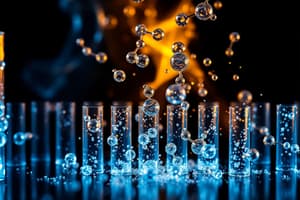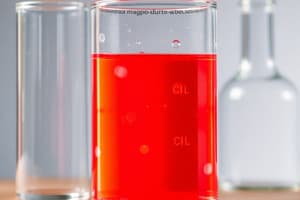Podcast
Questions and Answers
What do lithium, sodium, and potassium produce when they react with water?
What do lithium, sodium, and potassium produce when they react with water?
They produce hydrogen gas and a metal hydroxide.
Why are group 1 metals stored in oil?
Why are group 1 metals stored in oil?
They are stored in oil to prevent reactions with oxygen and water vapor in the air.
What trend is observed in the reactivity of alkali metals as you move down the group?
What trend is observed in the reactivity of alkali metals as you move down the group?
Reactivity increases as you go down the group.
Why are group 1 metals referred to as alkali metals?
Why are group 1 metals referred to as alkali metals?
What is the reason that alkali metals become more reactive down the group?
What is the reason that alkali metals become more reactive down the group?
What is the molecular mass of water (H₂O) when considering the atomic masses of hydrogen and oxygen?
What is the molecular mass of water (H₂O) when considering the atomic masses of hydrogen and oxygen?
What occurs to the arrangement of particles when a substance transitions from a solid to a liquid?
What occurs to the arrangement of particles when a substance transitions from a solid to a liquid?
Which statement is true about the atomic number of an element?
Which statement is true about the atomic number of an element?
Which statement accurately describes why alkali metals react strongly with water?
Which statement accurately describes why alkali metals react strongly with water?
What happens to the size of alkali metal atoms as you move down group 1?
What happens to the size of alkali metal atoms as you move down group 1?
Which best describes the atomic mass of an element?
Which best describes the atomic mass of an element?
Why is hydrogen important in the context of alkali metals?
Why is hydrogen important in the context of alkali metals?
How do the particles in a solid behave?
How do the particles in a solid behave?
What is the nature of metal hydroxides formed by alkali metals during their reaction with water?
What is the nature of metal hydroxides formed by alkali metals during their reaction with water?
If an element has an atomic number of 8, how many electrons does it have?
If an element has an atomic number of 8, how many electrons does it have?
What would be the effect of increased nuclear charge on the reactivity of alkali metals?
What would be the effect of increased nuclear charge on the reactivity of alkali metals?
Which of the following statements regarding liquids is false?
Which of the following statements regarding liquids is false?
What physical state are alkali metals typically found in at room temperature?
What physical state are alkali metals typically found in at room temperature?
What is the primary factor that influences the stability of an atom?
What is the primary factor that influences the stability of an atom?
Which option correctly describes the general behavior of alkali metals when exposed to air?
Which option correctly describes the general behavior of alkali metals when exposed to air?
What characteristic is common to all alkali metals?
What characteristic is common to all alkali metals?
Flashcards
Group 1 metal reaction with water
Group 1 metal reaction with water
Group 1 metals (lithium, sodium, potassium) react vigorously with water, producing hydrogen gas and a metal hydroxide.
Reactivity trend in Group 1
Reactivity trend in Group 1
Reactivity of Group 1 metals increases as you go down the group due to increasing atomic size and electron shielding.
Storage of Group 1 metals
Storage of Group 1 metals
Group 1 metals are stored in oil to prevent them from reacting with oxygen and water vapor in the air.
Alkali metal definition
Alkali metal definition
Signup and view all the flashcards
Reactivity increase reason
Reactivity increase reason
Signup and view all the flashcards
Subatomic Particles
Subatomic Particles
Signup and view all the flashcards
Atomic Mass Location
Atomic Mass Location
Signup and view all the flashcards
Neutron Charge
Neutron Charge
Signup and view all the flashcards
Proton Charge and Location
Proton Charge and Location
Signup and view all the flashcards
Isotope Definition
Isotope Definition
Signup and view all the flashcards
Isotope Example
Isotope Example
Signup and view all the flashcards
Atomic Mass Calculation
Atomic Mass Calculation
Signup and view all the flashcards
Group 1 Metal Reactivity
Group 1 Metal Reactivity
Signup and view all the flashcards
Average Atomic Mass
Average Atomic Mass
Signup and view all the flashcards
Isotopes
Isotopes
Signup and view all the flashcards
Solid Particle Movement
Solid Particle Movement
Signup and view all the flashcards
Solid to Liquid Change
Solid to Liquid Change
Signup and view all the flashcards
Molecular Mass
Molecular Mass
Signup and view all the flashcards
Atomic Mass
Atomic Mass
Signup and view all the flashcards
Atomic Number
Atomic Number
Signup and view all the flashcards
Mass Number
Mass Number
Signup and view all the flashcards
Study Notes
Alkali Metals
- Alkali metals react vigorously with water, producing hydrogen gas. Lithium, sodium, and potassium are examples.
- The reaction forms metal hydroxides, which are strong bases.
- Group 1 metals are stored in oil to prevent reaction with oxygen and water vapor.
- Reactivity increases down the group due to increasing numbers of electron shells.
- Alkali metals are named for the alkaline solutions they produce in water.
- Reactivity increases as atomic size grows, the outer electron is further from the nucleus making it easier to lose
- Hydrogen gas reacts with the alkali metals.
Studying That Suits You
Use AI to generate personalized quizzes and flashcards to suit your learning preferences.





